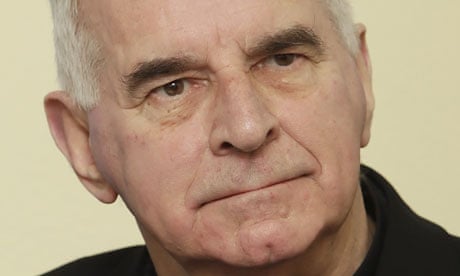The former leader of the Catholic church in England and Wales has denied that the Vatican forced Cardinal Keith O'Brien to step down early amid allegations of "inappropriate acts" against fellow priests.
Cardinal Cormac Murphy-O'Connor insisted that no pressure was brought to bear on the former archbishop of St Andrews and Edinburgh to quit ahead of schedule or to stay away from the conclave to choose the next pope.
"It was up to his own conscience that he stepped down. He wasn't asked to; he decided to do that," said Murphy-O'Connor. "As he said in his statement, I think he thought it would be a distraction to be in Rome. I think that was the main reason, the media attention.
"It was his decision to do so. He wasn't forced to do so; he wasn't asked to do so. He thought that given the publicity over the allegations, which are being contested by the cardinal, that was a better thing to do."
Speaking at a press conference that had been arranged before O'Brien announced his resignation, Murphy-O'Connor declined to say whether he thought the pope had decided to bring forward the date on which O'Brien's resignation took effect in direct response to the allegations. He also refused to comment on whether the fact that O'Brien's accusers were serving or former priests meant it represented a turning point in the abuse scandal for the church leadership.
Asked whether cardinals accused of protecting or failing to investigate paedophile priests should also stay away from the conclave, he said it was a matter for the individuals concerned.
"That would be up to them, up to their own consciences whether they decided not to go to the conclave," he said. "I think I ought to say there is an obligation on cardinals to go to conclave, so it'll be a decision in their conscience."
He did, however, issue an unequivocal call for the next pope to tackle the scandals that have proved so damaging to the church.
"As you know, there have been troubles in recent years and scandals, and these have to be addressed," he said. "The pope's own house has to be put in order."
Murphy-O'Connor added that the cardinals meeting to choose Pope Benedict's successor next month would be discussing the harm done by the sexual abuse scandals and looking at ways to change and renew their church.
"There is no doubt in my mind that there has to be reform and that these issues have to be addressed at the highest level, not only by the pope but by the bishops and I think that will be one of the main things the cardinals will be discussing," he said.
The cardinal also said the new pope would need to be a strong and fearless leader.
"When a new pope is elected he will know very well what the cardinals have discussed because he will have been part of the discussions," he said. "I think the new pope will go with a very clear message and I'm sure the new pope will also be appointed with a view to a man who's capable of government … capable of the kind of reform and renewal that's needed in the church at the present time."
He added: "There have been difficulties, there have been scandals and they've got to be addressed because otherwise there's no doubt – and it's something that saddens me deeply – that not just the image of the church but the effectiveness of the church … is also affected."
